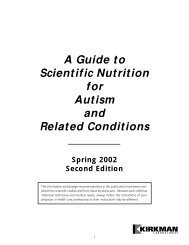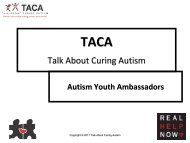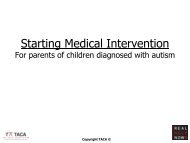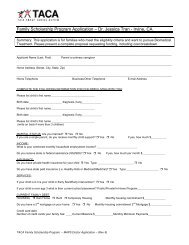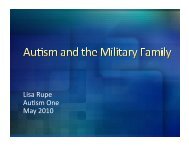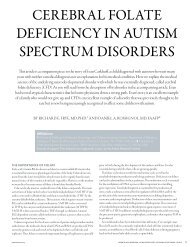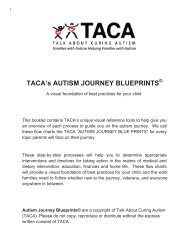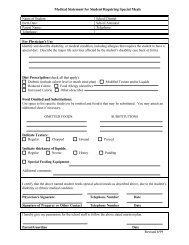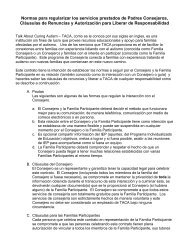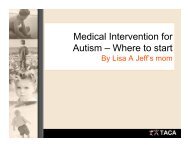- Page 1 and 2:
Autism Studies & Related Medical Co
- Page 3 and 4:
Values of free and total carnitine
- Page 5 and 6:
observation suggests that certain m
- Page 7 and 8:
with autism. These data suggest tha
- Page 9 and 10:
Markers rs2056202 and rs2292813 wer
- Page 11 and 12:
2- Autism and Gastrointestinal Infl
- Page 13 and 14:
than in nondisease controls (p
- Page 15 and 16:
Buie, T. M. (2005). "Gastroesophage
- Page 17 and 18:
control children and significant nu
- Page 19 and 20:
Horvath, K. and J. A. Perman (2002)
- Page 21 and 22:
components indicates a role of NFH
- Page 23 and 24:
patients with Crohn disease, one of
- Page 25 and 26:
analyzed by a registered pediatric
- Page 27 and 28:
oligonucleotide probes targeting pr
- Page 29 and 30:
would be effective in alleviating c
- Page 31 and 32:
demonstrate a focal CD8-dominated g
- Page 33 and 34:
Chlamydia pneumoniae and Streptococ
- Page 35 and 36:
vaccine (MCV), and once-exposed chi
- Page 37 and 38:
Wakefield, A. J., S. H. Murch, et a
- Page 39 and 40:
Walker SJ, Hepner K, Segal J, Krigs
- Page 41 and 42:
R, Maisawa S, Miki K. Guidelines fo
- Page 43 and 44:
approximately 73 and 37kDa in plasm
- Page 45 and 46:
Cook, E. H., Jr., B. D. Perry, et a
- Page 47 and 48:
evealed, that AAb level may serve a
- Page 49 and 50:
findings, which consisted of obstru
- Page 51 and 52:
angiography was performed in all fo
- Page 53 and 54:
matched non-autistic siblings had d
- Page 55 and 56:
Todd, R. D. and R. D. Ciaranello (1
- Page 57 and 58:
eaction was further confirmed by DO
- Page 59 and 60:
asic protein (MBP) and glial acidic
- Page 61 and 62:
exhibit higher than average levels
- Page 63 and 64:
Feasby, T., B. Banwell, et al. (200
- Page 65 and 66:
each group participated. Observatio
- Page 67 and 68:
Rossignol, D. A., L. W. Rossignol,
- Page 69 and 70:
Tsuru, T., M. Mori, et al. (2000).
- Page 71 and 72:
Anderson, M. P., B. S. Hooker, et a
- Page 73 and 74:
continue. The documented prevalence
- Page 75 and 76:
contributing factors may contribute
- Page 77 and 78:
Chauhan, V., A. Chauhan, et al. (20
- Page 79 and 80:
and folate-dependent methionine syn
- Page 81 and 82:
confirmed would indicate that autis
- Page 83 and 84:
differed significantly in the patie
- Page 85 and 86:
end products (AGE's) in autism brai
- Page 87 and 88:
cells in area 22 (p
- Page 89 and 90:
nutritional, and toxic status in au
- Page 91 and 92:
increase in autism in the last deca
- Page 93 and 94:
morphological, genetic and animal m
- Page 95 and 96:
Rossignol, D. A. (2007). "Hyperbari
- Page 97 and 98:
conditions have demonstrated improv
- Page 99 and 100:
not been investigated yet, several
- Page 101 and 102:
positively correlated in the autist
- Page 103 and 104:
abnormalities are present in brain,
- Page 105 and 106:
(tetrahydrobiopterin) were selected
- Page 107 and 108:
7 - Autism & Infection - 22 citatio
- Page 109 and 110:
micro-organisms. The faecal flora o
- Page 111 and 112:
Research Support, U.S. Gov't, P.H.S
- Page 113 and 114:
presentation of this syndrome among
- Page 115 and 116:
disorder. Yamashita Y, Fujimoto C,
- Page 117 and 118:
chronic infection may predispose to
- Page 119 and 120:
Streptococcus group A. Vojdani A, C
- Page 121 and 122:
provides a detailed analysis of a n
- Page 123 and 124:
PMID: 16897390 [PubMed - indexed fo
- Page 125 and 126:
syndrome and substance abuse, and a
- Page 127 and 128:
to contribute to metal-induced neur
- Page 129 and 130:
School of Medical Sciences, Tottori
- Page 131 and 132:
Review PMID: 16198633 [PubMed - ind
- Page 133 and 134:
diseases in humans. Zinc is redox-i
- Page 135 and 136:
Office of Vaccines Research and Rev
- Page 137 and 138:
PMID: 11746431 [PubMed - indexed fo
- Page 139 and 140:
into ferritin or heme. It is not ye
- Page 141 and 142:
9 - Dietary Intervention Studies -
- Page 143 and 144:
different peptidases resulting in a
- Page 145 and 146:
Mechanisms of non-IgE mediated adve
- Page 147 and 148:
Reichelt KL, Knivsberg AM.: Can the
- Page 149 and 150:
observations is the opioid-excess t
- Page 151 and 152:
Patients with gluten ataxia have an
- Page 153 and 154:
Hadjivassiliou M, Grunewald RA, Law
- Page 155 and 156:
Carroccio A, Montalto G, Custro N,
- Page 157 and 158:
Alberti A, Pirrone P, Elia M, Warin
- Page 159 and 160:
Thus, a number of milk protein frag
- Page 161 and 162:
Abstract: Institute ofPediatrics, L
- Page 163 and 164:
Abstract: Service de Psychopatholog
- Page 165 and 166:
times peer week) was effective in i
- Page 167 and 168:
Reichelt K.L., Knivsberg A.M., Lind
- Page 169 and 170:
terminal tetrapeptides into the lef
- Page 171 and 172:
Considerable clinical evidence sugg
- Page 173 and 174:
material of the P2 fractionation st
- Page 175 and 176:
Huebner FR, Lieberman KW, Rubino RP
- Page 177 and 178:
Four aspects of clinical evidence f
- Page 179 and 180:
Dohan FC: Wheat "consumption" and h
- Page 181 and 182:
from 24 children with autism from o
- Page 183 and 184:
matched control group. There was a
- Page 185 and 186:
administration on certain disorders
- Page 187 and 188:
PMID: 16581239 [PubMed - indexed fo
- Page 189 and 190:
Coleman M, Steinberg G, Tippett J,
- Page 191 and 192:
Dolske MC, Spollen J, McKay S, Lanc
- Page 193 and 194:
and myo-inositol (-13%) concentrati
- Page 195 and 196:
cobalamin. This was associated with
- Page 197 and 198:
(significantly lower ratio of SAM t
- Page 199 and 200:
Fifty-three controlled trials of th
- Page 201 and 202:
PMID: 6765503 [PubMed - indexed for
- Page 203 and 204:
Liebscher DH, Liebscher DE. About t
- Page 205 and 206:
from patients were examined at outs
- Page 207 and 208:
National College of Naturopathic Me
- Page 209 and 210: OBJECTIVE: Ionic magnesium (Mg(2+))
- Page 211 and 212: Pfeiffer CC, Braverman ER. Zinc, th
- Page 213 and 214: evidence support a role for omega-3
- Page 215 and 216: PMID: 1307234 [PubMed - indexed for
- Page 217 and 218: scavenge reactive species, then the
- Page 219 and 220: hyperactivity in patients with ADHD
- Page 221 and 222: esponse to folate deprivation. Expr
- Page 223 and 224: improvement may only become apparen
- Page 225 and 226: Walsh WJ, Glab LB, Haakenson ML. Re
- Page 227 and 228: use other internal or external stan
- Page 229 and 230: In contrast, therapy with very high
- Page 231 and 232: increased in affected children comp
- Page 233 and 234: largely unknown, but genetic, envir
- Page 235 and 236: Campbell DB, Sutcliffe JS, Ebert PJ
- Page 237 and 238: OBJECTIVE: Etiologically unexplaine
- Page 239 and 240: globulin and gamma globulins, IgA,
- Page 241 and 242: Fallon J. Could one of the most wid
- Page 243 and 244: Th1-like (IL-2, IFN-gamma) and Th2-
- Page 245 and 246: Jyonouchi H, Geng L, Ruby A, Reddy
- Page 247 and 248: that may be partly associated with
- Page 249 and 250: Department of Neurology, University
- Page 251 and 252: Mehler MF, Kessler JA. Cytokines in
- Page 253 and 254: Niehus R, Lord C. Early medical his
- Page 255 and 256: Pletnikov MV, Jones ML, Rubin SA, M
- Page 257 and 258: Silva SC, Correia C, Fesel C, Barre
- Page 259: cytokines were measured using speci
- Page 263 and 264: Department of Psychiatry, Indiana U
- Page 265 and 266: (DSM)-IV and the International Clas
- Page 267 and 268: Vojdani A, Campbell AW, Anyanwu E,
- Page 269 and 270: Warren RP, Cole P, Odell JD, Pingre
- Page 271 and 272: mechanisms in children with autism.
- Page 273 and 274: 12 - Environmental Toxicities (4 ci
- Page 275 and 276: 13 - Thimerosal and Toxicity A comp
- Page 277 and 278: PMID: 18364366 [PubMed - indexed fo
- Page 279 and 280: Eye Contact Lens. 2007 Jul;33(4):19
- Page 281 and 282: [Contact allergy to preservatives c
- Page 283 and 284: Marn-Pernat A, Buturović-Ponikvar
- Page 285 and 286: [Thiomersal and immunisations] Weis
- Page 287 and 288: 50: The evidence for the safety of
- Page 289 and 290: 59: Thimerosal induces DNA breaks,
- Page 291 and 292: 68: [Effect of the preservative thi
- Page 293 and 294: PMID: 8699562 [PubMed - indexed for
- Page 295 and 296: Mutat Res. 1993 May;287(1):29-46. P
- Page 297 and 298: Krug HF, Culig H. Mol Pharmacol. 19
- Page 299 and 300: Effect of organic and inorganic mer
- Page 301 and 302: Determination of mercury and organo
- Page 303 and 304: Cytotoxicity of mercurial preservat
- Page 305 and 306: Bourdineaud JP, Bellance N, Bénard
- Page 307 and 308: 14: Binstock Citations Controversie
- Page 309 and 310: neurodevelopmental delays, which in
- Page 311 and 312:
14. Geier DA, Geier MR. A comparati
- Page 313 and 314:
29. Boyd Haley, Ph.D. Reduced Level
- Page 315 and 316:
40c. Iacono G et al. Intolerance of
- Page 317 and 318:
affected children compared with bot
- Page 319 and 320:
"OBJECTIVE: Intestinal pathology, i
- Page 321 and 322:
67. Jeff Bradstreet, M.D. A Case-co
- Page 323 and 324:
in autistic children. In this curre
- Page 325 and 326:
87. Semba RD. Vitamin A and immunit
- Page 327 and 328:
"These results suggest that large o
- Page 329 and 330:
94. Bluhm DP, Summers RS. Plasma vi
- Page 331 and 332:
neonatal gut is different from that
- Page 333 and 334:
108. Thony B et al. Tetrahydrobiopt
- Page 335 and 336:
"Six chemicals, 2-halopropionic aci
- Page 337 and 338:
immunological functions in diseases
- Page 339 and 340:
[Note etiologic connection with thi
- Page 341 and 342:
149. Magazzu G, Scoglio R. Gastroin
- Page 343 and 344:
clinical presentations make celiac
- Page 345 and 346:
169a. Hadjivassiliou M et al. Does
- Page 347 and 348:
174. Headache and CNS white matter
- Page 349 and 350:
histology is difficult to interpret
- Page 351 and 352:
(n=25): marked 4%, moderate 28%, sl
- Page 353 and 354:
199. Stubbs EG et al. Autism and co
- Page 355 and 356:
205. Gill HS, Guarner F. Probiotics
- Page 357 and 358:
patients with IBS. Since the fermen
- Page 359 and 360:
demonstrate that probiotics possess
- Page 361 and 362:
237. James Neubrander, M.D. -- Bioc
- Page 363 and 364:
significantly more frequent in pati
- Page 365 and 366:
aseline. Physicians reported qualit
- Page 367 and 368:
http://www.publichealthreports.org/
- Page 369 and 370:
No Trade Name Sanofi Pasteur, Ltd 0
- Page 371 and 372:
Influenza, live FluMist MedImmune V
- Page 373 and 374:
Calculating Aluminum in Vaccines He
- Page 375 and 376:
16 - How Much Money is Spent on Vac
- Page 377 and 378:
consumer information (promotion mat
- Page 379 and 380:
evidence to the mercury-vaccine-aut
- Page 381 and 382:
More from Verstraeten (Now working
- Page 383 and 384:
18 -Difference between Number of Va



